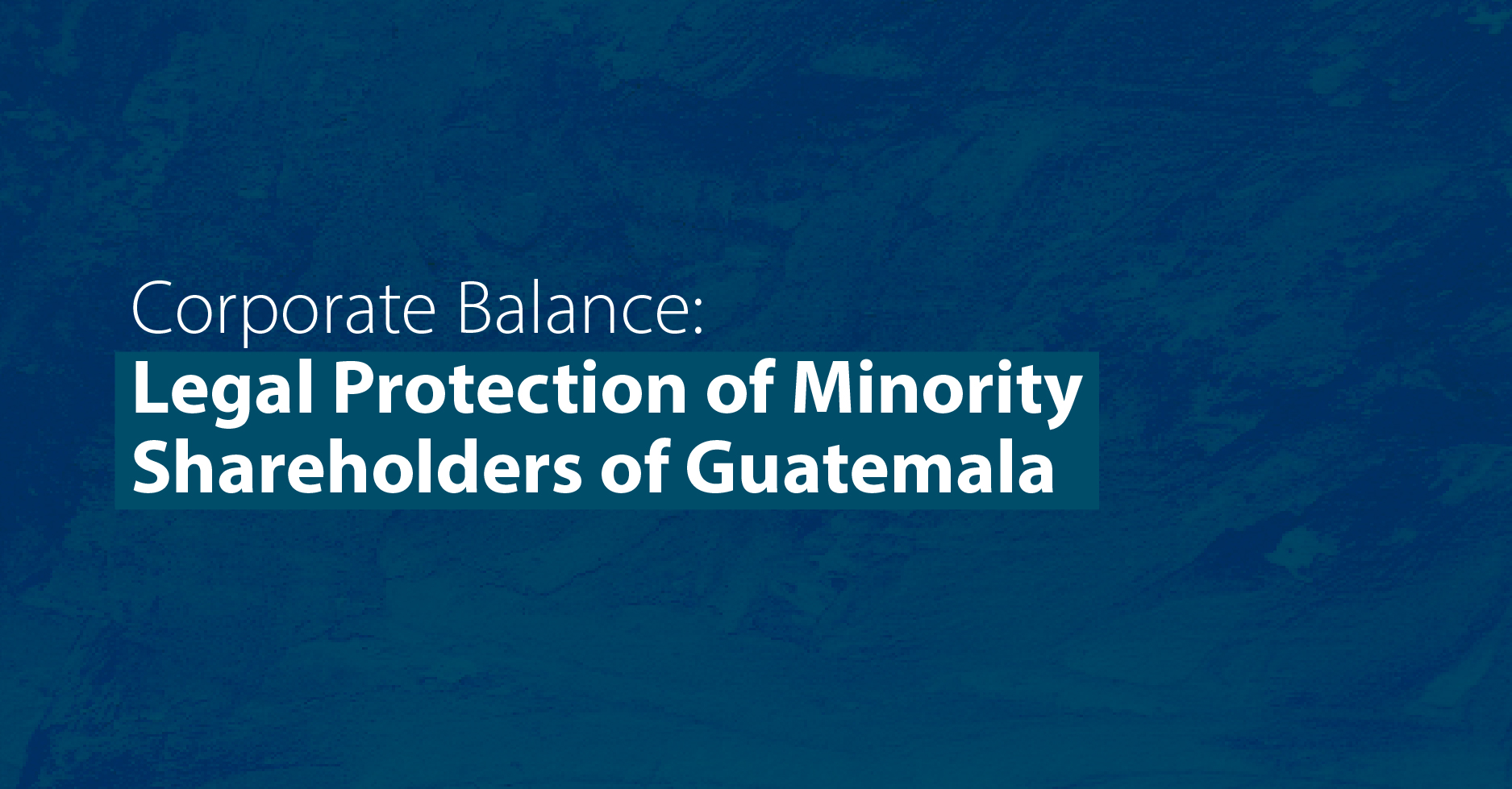Corporations, as essential economic engines, are not only structures for investment and capital growth, but are also scenarios for human relations and rights. Within them, we find a diversity of shareholders, from those who own large portions of the shares to those who have a more limited participation. The latter, known as minority shareholders, are often in a vulnerable position due to their lesser capacity to influence business decisions.
However, the importance of minority shareholders should not be underestimated. Non-controlling shareholders contribute by diversifying capital and adding a counterweight to the power of the majorities, enriching debate and enhancing decision-making. Ensuring their protection and rights is not only a matter of fairness, but also strengthens the transparency, equity and long-term health of a corporate enterprise.
Unfortunately, controlling shareholders, having a greater say in company matters, often make decisions that may favor their personal interests to the detriment of minority shareholders. These actions, when not properly balanced, can generate tensions and conflicts within the company, and in extreme cases, lead to unethical or unfair practices.
Therefore, it is essential that legislation recognizes and strengthens the rights of minority shareholders, establishing a legal framework that guarantees fair and equitable treatment for all members of the company, regardless of the size of their capital participation. This article intends to delve into the legal provisions that should be considered to protect minority shareholders effectively and, consequently, strengthen the structure and balance of our companies.
Need for Legal Protection
The protection of minority shareholders is not a recent topic of discussion. Throughout history, in different cultures and legal contexts, the need has arisen to safeguard the rights of those who, despite having a minor participation in the capital stock, are essential to corporate dynamics.
From the earliest formation of companies and corporations, the natural tendency has been for shareholders with more capital to exercise significant control over the decisions and direction of the company. However, this control, without balancing mechanisms, has sometimes led to unilateral decisions that do not always consider the general welfare of the company or fairness to all its members. As the business world has evolved, the need to implement regulations and practices to protect minority shareholders from possible abuses has been recognized.
Although one might think that a reduced number of shares implies less relevance, the truth is that minority shareholders play vital roles in corporate balance, for example:
Diversity of opinions: They allow for a greater variety of viewpoints in decision-making, enriching the debate and avoiding monopolization of thought.
Investment and stability: Diversity in shareholding composition can lead to greater financial stability, as the company does not depend on a few investors.
Oversight and control: Although they have a smaller participation, their presence can serve as a counterweight and oversight, ensuring that the decisions made are for the benefit of the company and not just a small number of self-interested parties.
Implications of not protecting the rights of minority shareholders:
Market distrust: If investors feel that their rights will not be respected, they may shy away from investing, affecting capital attraction and company valuation.
Internal conflicts: Lack of protection can lead to internal conflicts, distracting company resources and time, and affecting its productivity and reputation.
Biased decisions: Without proper protection, corporate decision-making risks being biased towards the benefit of a few, which can lead to sub-optimal and possibly damaging decisions in the long run.
Legal protection of minority shareholders is not only a matter of fairness and ethics, but also a smart strategy to strengthen the business fabric, encourage investment and ensure the long-term sustainability and health of our corporations.
The Need for Minority Shareholder Protection in Guatemalan Law
Business creation and development in any country require a solid legal infrastructure that inspires confidence and promotes investment. In Guatemala, the current corporate legal framework recognizes the importance of minority shareholders and, to some extent, provides them with specific safeguards. However, are these provisions sufficient?
First, it is essential to recognize that Guatemalan law includes significant provisions that protect minority shareholders, such as:
Cumulative voting for the election of the management body: This provision enables minority shareholders to have significant representation in management, ensuring that company decisions consider their interests in matters of importance.
Access to information prior to general shareholder meetings: This measure guarantees transparency and enables minority shareholders to be informed and prepared to participate actively in the meetings.
Possibility of requesting before a judge the holding of the annual ordinary general meeting: In the event that the meeting is not called, minority shareholders can resort to judicial proceedings to ensure that their rights are not overlooked, and the request can be made before the corresponding judge by a lower percentage of participants than that established by current regulation.
Prohibition of unfair agreements and preferences: This measure prevents the establishment of agreements that disproportionately favor one group of shareholders to the detriment of others, thus ensuring equity and fair representation for all.
Despite these advances, it is evident that there are still areas in which Guatemalan law can and should be more protective of minority shareholders. Modern societies, globalization and business practices suggest the need for a reform to the Guatemalan Commercial Code. This reform should not only strengthen current provisions, but also introduce new measures that reflect international trends and best practices regarding the protection of minority shareholders.
Reforms for the Protection of Minority Shareholders
Modern business dynamics demand that legislation adapts to emerging challenges, guaranteeing a framework where minority shareholders not only feel protected, but also valued and appreciated. Some reform proposals that would strengthen their position in the Guatemalan corporate sphere include:
- Mixed Boards of Directors. Although cumulative voting is a valuable tool, it can sometimes fail to ensure adequate representation of minority shareholders on the governing body. Mixed Boards, which include both majority and minority representatives, could provide a more balanced and diverse view in decision-making.
- Right to Audit. Transparency is essential for any company seeking to grow and consolidate its market position. It should be made easier for minority shareholders to request external audits expeditiously if they suspect inappropriate management, providing an oversight tool and guaranteeing the integrity of the administration.
- Right of Preference. Although this right is already regulated, the fact that a contrary agreement is allowed weakens it. This provision should be unalterable, guaranteeing that minority shareholders have the priority option of acquiring shares before outsiders, thus strengthening their position in society.
- Mandatory Right of First Refusal. This right would enable any shareholder, including minority owners, to have a preferential option in the acquisition of shares that another shareholder wishes to sell, thus preventing the entry of undesirable shareholders and facilitating the growth of a minority shareholder’s equity interest.
- The inclusion of minority shareholder votes on key decisions such as a corporate merger or a drastic change in the company’s business should meet with broader approval. Incorporating the affirmative vote of minority shareholders in such decisions ensures that multiple perspectives are considered and the welfare of the corporation as a whole is protected.
- Transparency in compensation. Compensation determination of senior management and directors must be transparent and require the approval of a qualified majority that includes the vote of minority shareholders. Currently these decisions are taken in ordinary general shareholder meetings and can be approved without considering the will of minority shareholders.
These proposals, along with others that may emerge from a thorough analysis, would strengthen the position of minority shareholders in Guatemala. It is essential to recognize that their active and protected participation is not only a right, but also an essential element for the growth and stability of any society.
A viable and beneficial option for minority shareholders is the implementation of shareholder agreements. Such agreements allow the establishment additional rights and specific provisions to strengthen a minority position and guarantee an equitable participation in the company. It is crucial to note that these agreements only bind those shareholders who are part of them, and therefore do not generate direct obligations for the company as a whole. Additionally, it is essential that the provisions contained in these agreements do not contravene the terms of the company’s articles of incorporation. Therefore, it is necessary to review carefully the consistency between both documents to avoid legal incongruities.
While awaiting a regulatory update, the shareholder agreement emerges as a practical and effective tool to protect the interests of the minority. It is a mechanism that allows for adaptation to the specific circumstances of each company and offers the necessary flexibility to adjust to the needs and expectations of its shareholders. At the end of the day, it is essential that each participant in a company considers their interests properly supported and protected, thus ensuring corporate harmony and productivity.
Implications of these Protections
Protecting minority shareholders is not only a matter of fairness and equity, but is of profound value to the ethical management and sustainable performance of a company. Below, we explore how these provisions, by safeguarding minority interests, inject financial health and strengthen corporate reputation.
- Ethical Corporate Management: Protective measures for minority shareholders encourage transparency and fairness in corporate decision-making. Having a plurality of voices and points of view fosters an environment in which accountability and integrity feature prominently. The company becomes less susceptible to poor choices that can arise from unilateral management or interests concentrated in a small group.
- Sound Decision-making: Companies that consider and value the opinions of their minority shareholders tend to make more thoughtful decisions. The integration of diverse perspectives makes strategic decisions more balanced and, consequently, less prone to errors or biased viewpoints.
- Financial Health: Minority shareholder protection can attract broader investment. Investors, seeing that a company respects and protects its minority shareholders, may interpret this as a sign of good management and lower risk, increasing a company’s investment attractiveness, resulting in greater liquidity and a better financial position.
- Robust Corporate Reputation: In an era where information flows with ease and speed, whether management favors or prejudices minority shareholders can quickly become known to the public. Companies that demonstrate a commitment to equity and inclusion of all shareholders, regardless of size, are more likely to gain reputation and trust, key factors for growth and consolidation in the marketplace.
- Business Stability and Durability: Companies that protect their minority shareholders are generally more resilient to crises or market turbulence. Fostering an environment of respect and fairness cultivates long-term relationships, both internal and external, which can be vital in critical times.
In conclusion, minority shareholder protection goes beyond mere legal provision. It is a management philosophy that, when adopted, can be a pillar for the success, sustainability and robustness of a company in the competitive corporate world.
Rodolfo Salazar
Partner
Guatemala
E-mail




